Central America
El Salvador and Qatar enhance friendship and cooperation
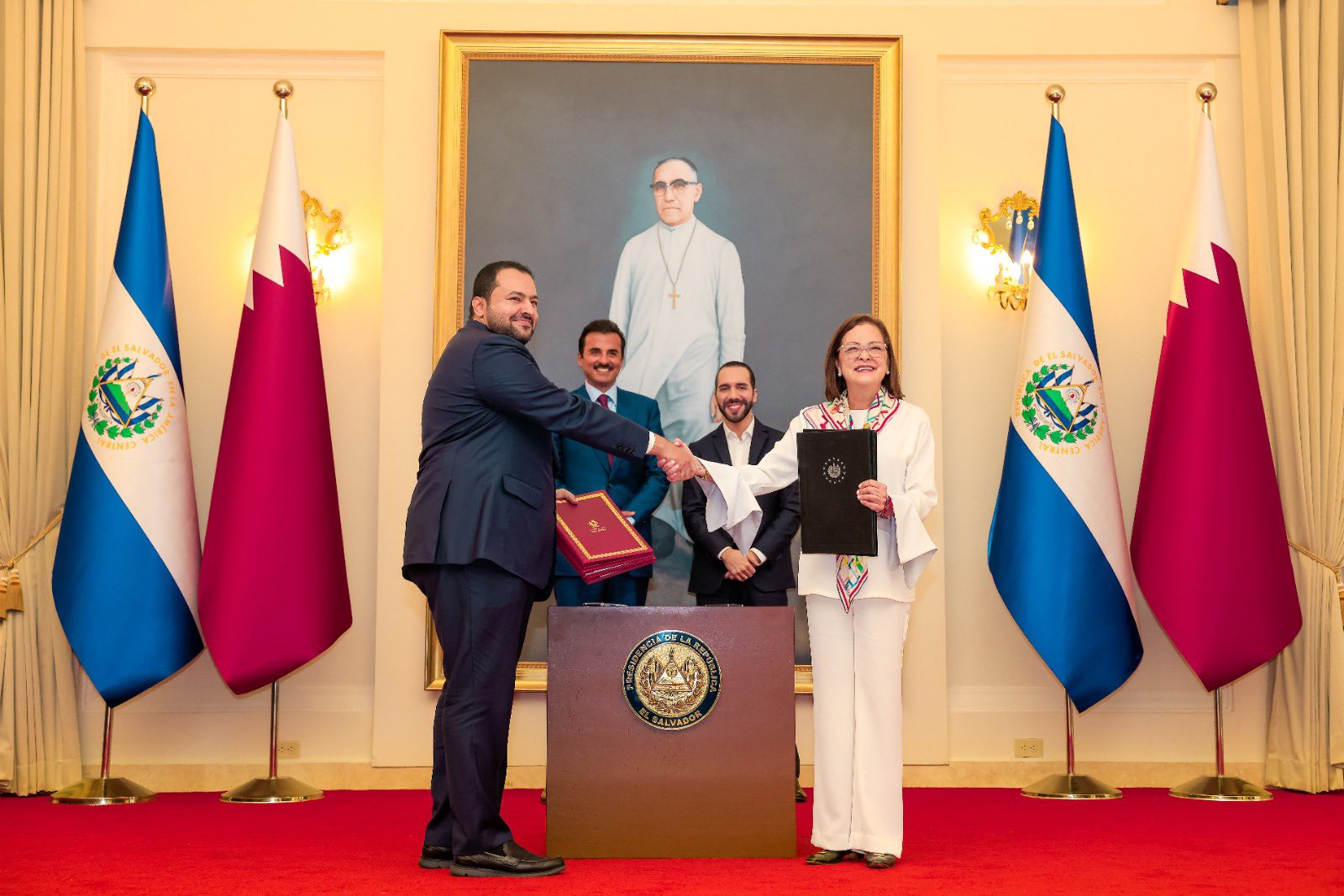
September 14 |
The governments of El Salvador and Qatar signed yesterday important agreements on security, health and agriculture, which further strengthen bilateral relations and the strategic alliance and cooperation between the two nations.
These mutual cooperation agreements were signed after a working meeting held at the Presidential House between the President of the Republic, Nayib Bukele, and the Emir of the State of Qatar, Tamim bin Hamad Al Thani, in the framework of an official visit of the Qatari Sheikh to the country.
“We discussed relations with El Salvador and mainly talked about different projects and ideas in common,” said Al Thani after the bilateral meeting.
The agreements and arrangements reached will strengthen cooperation in the fields of security, health and agriculture.
The Qatari sheikh also congratulated Bukele for the achievements he has had during his administration that have led El Salvador to position itself in the concert of nations.
“I want to thank and congratulate everything he has done in his country, especially on the issue of security. I think the whole world recognizes this,” he said.
Al Thani arrived in El Salvador on Tuesday afternoon in response to Bukele’s invitation to him in 2019, when he went to the State of Qatar on an official mission.
The emir sent a message upon his return: “We aspire to more bilateral cooperation and we both have compatible visions about ways to take advantage of the opportunities and the great potential that our countries have. I thank you for the hospitality with which you received me and the delegation that accompanied me”.
Prior to the bilateral meeting, the Salvadoran government formulated proposals for investment projects through the Ministry of Foreign Affairs and other government institutions. The agreements were signed by Foreign Minister Alexandra Hill and the Minister of State in the Ministry of Foreign Affairs of Qatar, Mohammed bin Abdulaziz bin Al-Khulaifi.
The visit of His Royal Highness to El Salvador “will allow to deepen the proposals for joint work in sectors such as passenger and cargo transportation, ports and airports, and mass passenger transportation, among others”, informed the Salvadoran Government.
Vice Minister of Foreign Affairs Adriana Mira visited Qatar a few months ago to begin exploring the possibilities of mutual support and also to strengthen ties of friendship.
With the visit of the Qatari sheikh, the economic and commercial ties between the Arab nation and El Salvador are also strengthened – within the framework of the agreements signed – by means of approaches between the private sectors of both countries.
Since his arrival to the Executive, President Bukele began to work for a new foreign policy that would allow El Salvador to have new strategic partners for the development and welfare of its inhabitants.
El Salvador established diplomatic relations with Qatar in 2003, and the State visit of Emir Al Thani addressed “issues of cooperation and common interest to further strengthen bilateral relations”.
The Embassy of the State of Qatar in El Salvador praised the visit of His Royal Highness: “The relations between the two countries are deep and developed. The visit of His Highness the Emir of the State of Qatar will contribute to expand relations towards broader horizons”.
Food trade and investment have been explored with Qatari partners. The Pacific Train and Pacific Airport have been of interest to the Qatar Investment Authority (QIA). Qatar Airways has also expressed interest in establishing a cargo and passenger route.
The Emir of the State of Qatar, Tamim bin Hamad Al Thani, left the country yesterday afternoon, after finishing his official visit that began last Tuesday. He was seen off at the San Oscar Arnulfo Romero International Airport of El Salvador by Vice President Felix Ulloa.
International
VP JD Vance to World Cup visitors: “Enjoy the game, then go home”
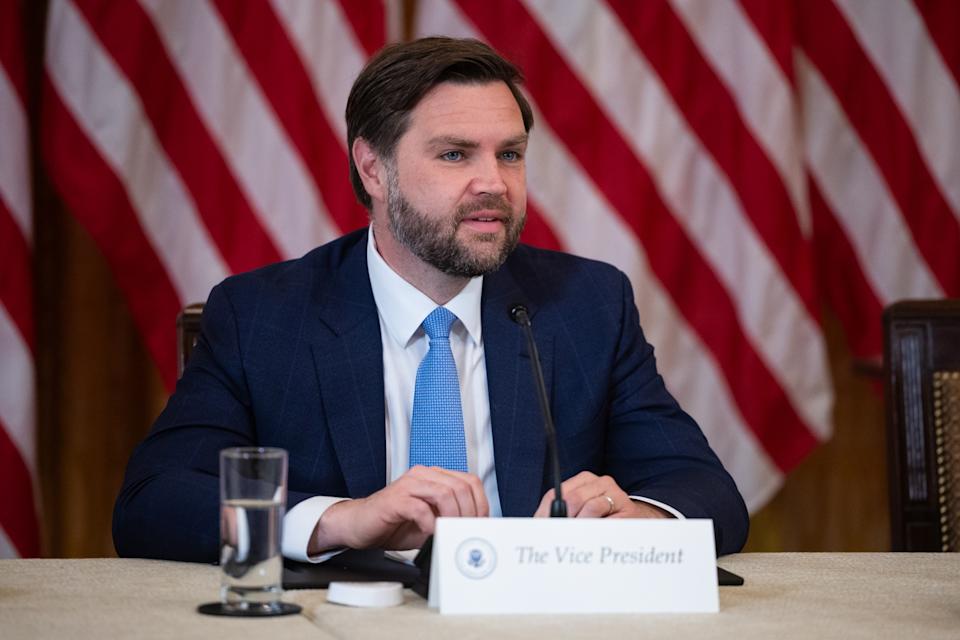
U.S. Vice President JD Vance issued a light-hearted but firm warning to international visitors planning to attend the 2026 FIFA World Cup, which will be co-hosted by the United States, Canada, and Mexico.
“We know we’ll have visitors, probably from close to a hundred countries. We want them to come. We want them to celebrate. We want them to enjoy the games,” said Vance during a press conference on Tuesday focused on the organization of upcoming major sporting events in the U.S.
“But when it’s over, they’ll have to go home,” he added.
Vance, speaking in a joking tone, also mentioned Homeland Security Secretary Kristi Noem, saying, “Otherwise, they’ll have to speak with Secretary Noem.”
The comment came during the first joint working session aimed at preparing for the 2026 World Cup, which will feature 48 national teams and take place across multiple cities in North America.
Central America
Thousands of Guatemalan girls forced into motherhood due to sexual violence
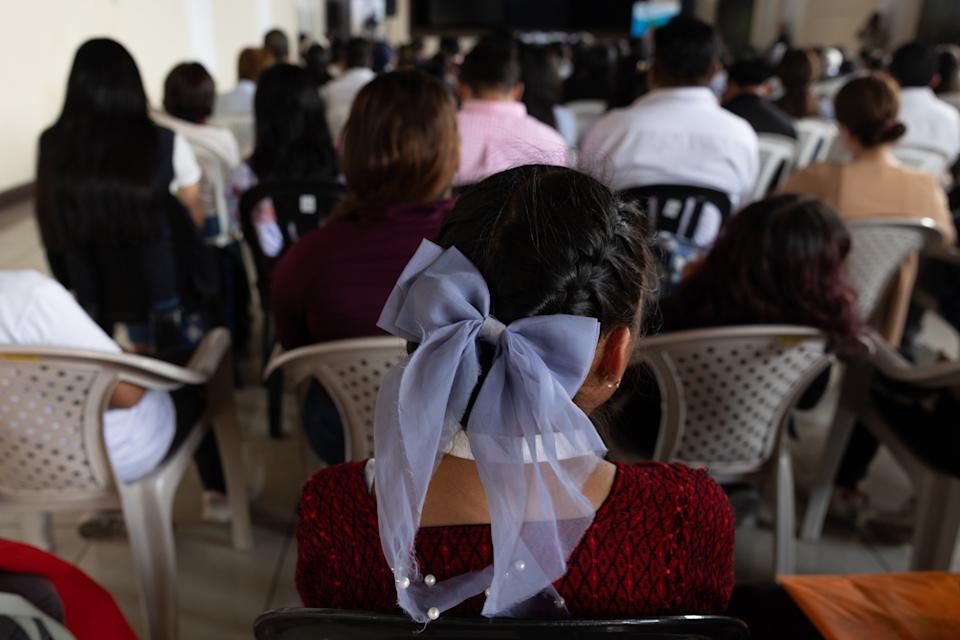
Each year in Guatemala, an average of 2,000 girls aged 10 to 14 become mothers as a result of sexual violence, and 99% of these cases go unpunished, according to a report released Wednesday by the Human Rights Office of the Archdiocese (ODHAG).
“Girls in the country live under state abandonment. They are exposed to a judicial and health system that, upon becoming pregnant, forces them into motherhood and to abandon their life plans,” said Dr. Mirna Montenegro, lead researcher of the investigation, during a press conference.
Montenegro emphasized that between 2022 and 2024, the Ministry of Health recorded 5,937 births to girls aged 10 to 14.
“What’s most alarming is that only 1% of these cases have been brought to court since 2018—just around 100 cases—and this doesn’t mean the accused rapists were convicted,” she stressed.
The investigation also found that the government program “VIDA”, created to support girls who are victims of sexual violence, served only 129 minors in 2024, despite 1,953 pregnancies reported among girls in that age group.
In addition, the report noted that in 2023, 3,064 cases of sexual violence against minors under 19 were reported nationwide. The majority of victims were girls aged 10 to 13.
The areas most affected by child pregnancies include Huehuetenango, Alta Verapaz, and Quiché in the north, as well as Guatemala City in the central region.
According to the most recent Ministry of Health data, as of February 2024, 1,041 girls under 14 had already become mothers. Another 1,005 girls of mestizo origin were also reported to have become mothers due to sexual violence.
Central America
Experts urge action to protect democracy ahead of Honduras elections
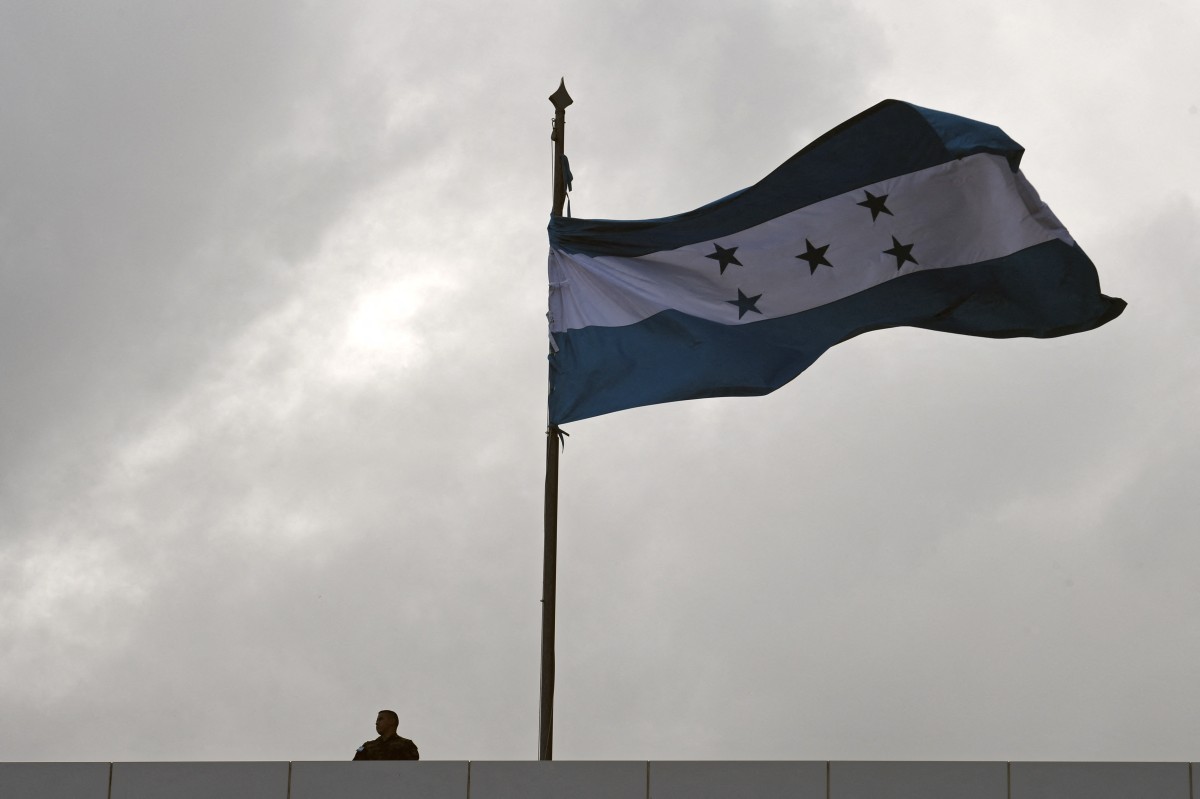
Experts issued an urgent call on Wednesday to confront the threats and systemic flaws that could endanger democracy and civil liberties in Honduras, as the country prepares for its general elections on November 30, when voters will elect a successor to President Xiomara Castro.
César Espinal, coordinator of the Corruption Observatory at the National Anti-Corruption Council (CNA), told EFE that it is crucial to overcome the “atmosphere of uncertainty” generated during the March primaries, which were marred by irregularities in the delivery of electoral materials, causing delays of over twelve hours at several polling centers.
Espinal emphasized that the lack of internal coordination and the institutional weakening of the National Electoral Council (CNE) present major challenges to rebuilding public trust and encouraging strong voter participation.
“We believe that the main challenge lies in the disagreements and lack of coordination within the National Electoral Council, as it is the council members who make key decisions to guide the upcoming electoral process — especially in adhering to the timeline and addressing the various stages from now until November,” he explained.
-

 International4 days ago
International4 days agoHouthis threaten israeli airports, urge airlines to cancel flights
-

 International4 days ago
International4 days agoAmerican Airlines sued after woman alleges sexual assault on flight
-
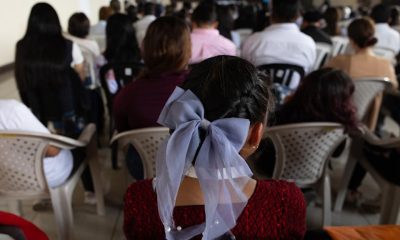
 Central America1 day ago
Central America1 day agoThousands of Guatemalan girls forced into motherhood due to sexual violence
-

 International3 days ago
International3 days agoSinaloa Cartel faction leader ‘Chuy’ Guzmán Castro detained in Mexico amid rising violence
-
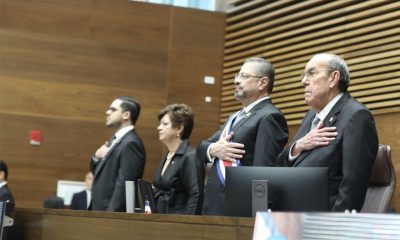
 Central America3 days ago
Central America3 days agoCosta Rica congressional leader warns of authoritarian drift under president Chaves
-
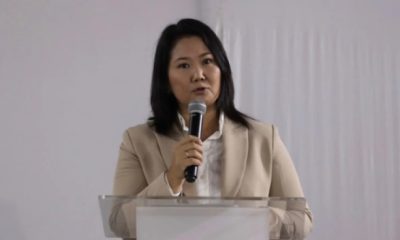
 International3 days ago
International3 days agoProsecutor José Domingo Pérez reinstated in Fujimori corruption case
-

 International3 days ago
International3 days agoSpain approves plan to reduce workweek to 37.5 hours
-

 International3 days ago
International3 days ago“Give me a break”: Trump defends AI image of himself as the Pope
-

 Sin categoría3 days ago
Sin categoría3 days agoPope Francis donated Popemobile transformed into mobile clinic for Gaza’s children
-

 International3 days ago
International3 days agoSheinbaum rejects U.S. military presence in Mexico’s war on drugs
-

 International3 days ago
International3 days agoSins of the Vatican: Scandals, abuse, and a cardinal’s fall from grace
-
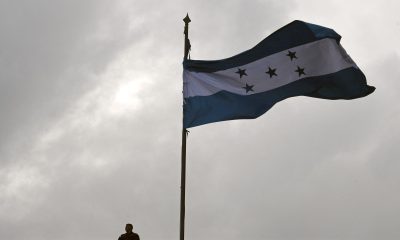
 Central America1 day ago
Central America1 day agoExperts urge action to protect democracy ahead of Honduras elections
-

 International1 day ago
International1 day agoLong wait at the Vatican: experts defend lengthy papal election process
-

 International1 day ago
International1 day agoXiomara Castro’s government vows to protect citizens amid threat reports
-
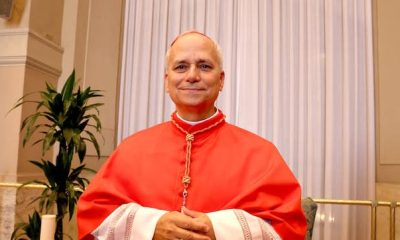
 Internacionales8 hours ago
Internacionales8 hours ago“A great honor for our country”: Trump congratulates Pope Leo XIV
-

 International8 hours ago
International8 hours agoBill Gates accuses Elon Musk of endangering the world’s poorest children
-

 International8 hours ago
International8 hours agoGates Foundation to close by 2045 as Bill Gates pledges to donate $200 Billion
-

 International8 hours ago
International8 hours agoVP JD Vance to World Cup visitors: “Enjoy the game, then go home”
-

 International8 hours ago
International8 hours agoStrong winds cause stage collapse in Mexico City; seven hurt

































































































